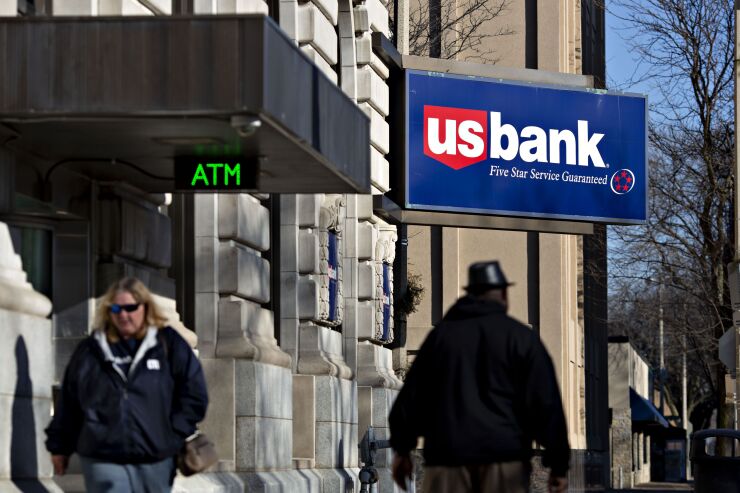
Business travel is ramping up despite inflation and other economic challenges, creating a race among payment providers to reduce overhead for price-sensitive clients.
U.S. Bancorp on Tuesday launched a travel payments and management platform designed for emerging middle market companies or firms with $150 million or less in yearly revenue. Called the U.S. Bank Commercial Rewards Card, the product builds on the bank's 2021 acquisition of the fintech
The card competes against a growing number of fintechs that are pushing technology such as generative artificial intelligence to streamline business travel.
"As businesses grow, they have more complex needs," said Daniel Skaggs, senior vice president and group product manager in the corporate payment systems division at U.S. Bank. "They have big company problems but don't have big company staff."
The U.S. Bank-issued travel card integrates with business travel services such as spend management, compliance, expense reporting, data analysis and incentive marketing.
"Many of the travel payment platforms out there were created for consumers and then adapted for small businesses," said Duke Chung, founder and CEO of TravelBank, which operates as part of U.S. Bank, adding that this practice makes the user experience clunky and overly reliant on paper.
TravelBank, which launched in 2021, operates on a software-as-a-service model, which means it hosts the technology on behalf of clients. It uses artificial intelligence to remove physical documentation and manual work from reporting. "All expenses are reconciled to the company's back end. You don't have to upload photos and documents for expense reporting," Chung said.
TravelBank is examining potential uses for more advanced generative AI to improve the user experience by making it more intuitive. Generative AI refers to the use of accrued data to produce original content. In financial services, early uses include making customer service more intuitive or conversational. For travel, that could mean streamlining steps involved in the workflow such as searching for an airline or hotel, booking a ticket or reservation, paying for the trip and matching the expense to corporate policy.
"Maybe one day you won't even have to think about an expense report," Chung said. "Eventually the expenses could all be done behind the scenes. The overall goal is to give companies greater control over spending."
Business travel is expanding, particularly in the midsized corporate market that U.S. Bank and many of its competitors are pursuing. Sixty-eight percent of companies with annual revenue of under $1 billion have expanded their travel budgets in 2023, compared to 41% of larger firms, according to
That's opened the door for both banks and fintechs to bring new travel offerings to market. The fintech
Navan, a fintech that manages travel payments, expanded its generative AI-powered tools for corporate travel and other business expenses in the past month.
Ava, whose name also refers to a chatGPT-generated character, was expanded from supporting consumer traveler services to corporate spending managers. Ava uses generative AI to parse travel and entertainment spending data. This informs Ava's answers to questions on payments, booking and other questions. Ava additionally searches for less expensive and more efficient itineraries and automatically produces executive summaries in multiple languages and formats.
"We know if there's a flight delay and we can start curating other options for you. OpenAI and chatGPT have made that much more conversational and easy to use," said Michael Sindicich, executive vice president and general manager of Navan Expense.
Navan began working with openAI, the Microsoft-backed firm that developed chatGPT, shortly after Navan rebranded from TripActions in February. As TripActions, the firm in 2022 launched an automated
Navan in the past month also introduced an expense management product that enables firms to sync Navan with their staff's existing credit cards, including incentive marketing, other promotions and a dashboard view of corporate spending.
"People don't want to have a different 'new thing' to manage while at work," Sindicich said.
Other technology firms that use AI to streamline corporate travel booking and payments include AppZen and TravelPerk.
The expense approval process is a significant time sink in travel and entertainment management, according to Anatolii Ulitovskyi, a technology consultant and founder of search engine optimization firm UNMiss.
"Traditional manual approval is not just slow but prone to human errors. AI-driven automation can validate expense claims against policy rules for instant approval, eliminating the need for manual checks," Ultovskyi said. AI's learning capabilities can personalize travel options based on employees' preferences, leading to higher satisfaction levels and increased adherence to policy guidelines, Ultovskyi added.
"While difficult to quantify, this aspect has a profound impact on the overall compliance and cost-effectiveness of T&E management," he said.






